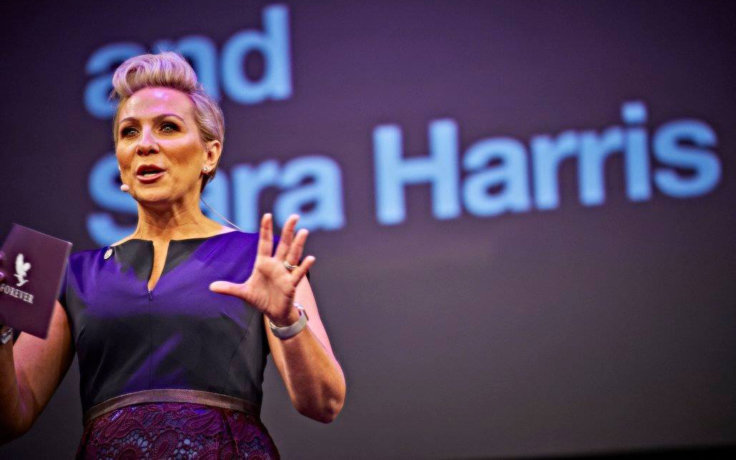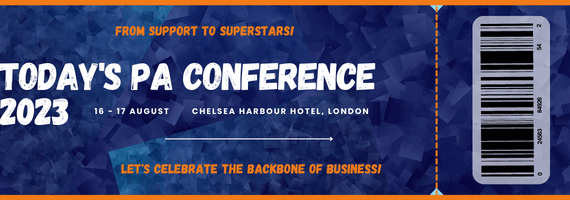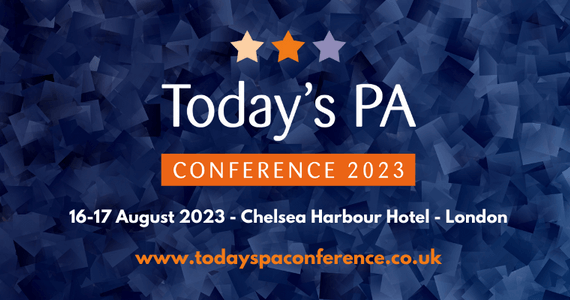Shopping cart
Your cart is empty
£0.00

Sara Harris MBE believes that in life you never stop learning. Whatever your role, whatever stage you’re at in your career, you can enhance your knowledge and creativity by learning from everyone around you and from every situation.
It’s an idea that has stood Sara in good stead, both personally and professionally. She left school at 16 without the grades needed to study occupational therapy – but refused to let this hold her back. Her career to date has taken her from a teenager taking her first tentative steps in the Army, to being a high-flier in the corporate world, to becoming self-employed, doing something she loves and finding that enviable work/life balance.
Ahead of her talk at the Today’s PA Conference, we spoke to Sara about why we should never stop learning and how, by believing in ourselves and our abilities, we can all take control of our lives.
“My Father had been in the Army, and my sister had joined a few years before. I had an idea I wanted to become an occupational therapist but when I didn’t get the grades, to be honest, I didn’t know what else I wanted to do. I think that, at 16, you don’t necessarily know what you want to do with the rest of your life.
I had visited my sister, seen the life she had, and thought, “that all looks good fun!”. So my Mum took me along to the Army Careers Office. I did the test and they told me what roles were on offer … and then I signed on the dotted line.
That was towards the end of 1989, and I started my training on 7th Feb 1990. I was 17 years old – and I stayed with the military for 12 years.”
“Similar to a PA role but part of an enormous team. I originally joined the WRAC (Women’s Royal Army Corp). After they dispersed, I moved into the newly formed Adjutant General’s Corps together with other support roles and other trades, working all over the world, taking on various different projects. Over the years, as I gained confidence and experience, the roles became bigger, and I had more ownership of the projects – including managing and coordinating all the military invites to the Royal Garden Parties!
I finished my Army career working at the MoD, in a unit called the Chief of Staff’s Secretariat. Many aspects of that role did equate to that of a PA/EA. Not diary management, that wasn’t part of my remit. But I was involved in planning, project management, and scheduling. So, yes, it was a PA-orientated role, working on specific projects, just within a much larger team.”
“For the first six years of my career, it was predominantly Army. We were working in war zones as part of the multi-national services, so the challenges were dealing with different communities, a range of nationalities and cultures, and the language barrier.
In my last role, I was working with senior service personnel, working tri-service (with the heads of the Army, Navy, and Air Services). My boss reported directly to the Prime Minister. And supporting someone at that level brings its own challenges, working with different personnel and managing a wide range of priorities. In that respect, it was no different to a corporate role.
However, in a corporate role, you are all working for one company. If you’re working for a CEO, then you’re looking after the CEO and his team. In tri-service, everyone has different needs. Instead of a Board of Directors, you’re liaising with the heads of the Air Force, the Army, the Navy, and all the people surrounding them. On top of that, you’re also dealing with MPs and other senior leaders.
Again, the challenges were similar to that of a PA in that I was supporting my boss. But at the same time, there was a need to consider the wider picture, managing expectations and balancing the demands of many more people.”
“In the military, you do either three, 12, or 22 years, and in 2001 I was coming up to my 12-year point. Given that I had worked for the most senior military dignitaries, I felt it was a case of, well, where do I go next? I was then interviewed to work for Prince Charles, and it was at that point that I really had to consider where I could go after working for an HRH. That appointment would have been for a further three years, taking me up to my 15-year point. It would have been a phenomenal opportunity, but I then would have a further seven years of my military career left to run. So after having talked it over with my partner (who wasn’t in the military), I decided that it was the right time to leave. I loved the Army and loved my career, so I didn’t want it to just fall flat.
I made my decision to leave and I was out within four weeks! That sounds quick – and it was. It’s normally a two-year transition period, so it was super-quick. However, because I was working at MoD, even though it was still within a military environment, it almost felt as if I was out of the Army already. I was working with civil servants, I was wearing a suit to work rather than a uniform, living in London, getting the tube to work. I thought it would be an easier transition to leave at that point.
Did I know what I was going to do? No, no idea! I started to look around, registered with recruitment agencies, went to a couple of interviews, and suddenly had two job offers on the table. One was the role I went into, that of office manager for a small niche company specialising in risk management, and the other job was with Arcadia Group, working in the outer office of Philip Green.
Looking at the transferable skills I had, I decided to go for the smaller company, thinking the office manager role would be more suitable. It was an EA/Office Manager role working for the CEO. But after eight months, the company went bust. That was a bit of a shock – going from having all security around you for 12 years, and then it all goes pop! In hindsight, it probably wasn’t the right role for me. But they say that when you leave the military, the first role will never be the right one.
I went back to the agency and they offered me a recruitment role. It was an interesting 10 months, learning about recruitment as I went along, but I soon realised that it wasn’t for me!
A few months temping in the City gave me an idea of what I wanted to do, and, more importantly, what I didn’t want. A PA role came up with Energis, a telecoms company, which sounded good – and that was the turning point. My career just grew from there. I worked my way up the corporate ladder through two mergers, as Cable & Wireless bought out Energis, and then Vodafone bought Cable & Wireless. Each time the company got bigger, my role just grew. From a smallish telecoms company with around 3,000 staff, I was then in a huge organisation employing over a hundred thousand people around the world.”
“To be honest, those first eight months after I left the Army, I was really shocked at how insular people seemed. It was as if everyone had their own game. There wasn’t any team spirit.
The corporate world can be ‘dog eat dog’. You have to survive. And a lot of people don’t know how to work in a team. For instance, I was working for the CEO and was his right-hand person for 11 years, travelling around the world on his behalf, and I was part of the senior exec team myself. But even at that level, people still had their own agenda. If, in the military, you have to go to into a war zone, you know people have your back. Sadly, I would never say that about the corporate world. I think that’s why many people struggle when they leave the military, because they’re looking for a sense of a community that just isn’t there.”
“My business has two sides: helping people build a business from home, coaching and mentoring, plus my motivational speaking. The two sides come together but can also be quite separate and individual as well.
Many of the people I’ve coached and mentored have struggled to overcome obstacles. And they’ve gone on to achieve things they would never have dreamt possible. It’s giving people the confidence to believe in themselves and in their abilities.
Everyone interprets achievement in different ways. So perhaps I’ll be working with someone who wants to be more successful in business, or perhaps get their work/life balance back on track, or even to get to a healthier place in their lives.
I think I’ve also been able to show people that anything is possible. If someone had told me seven years ago that I would stand in front of 5,000 people and host an event at the NEC, I would have laughed and said, “don’t be so ridiculous”. But I did stand up in front of all those people at the NEC. It actually happened. It’s as true for anyone else as it is for me. If you believe in yourself, you can achieve want ever you want.”
“There are people who help me with various projects, but I don’t have a PA at the moment. I probably will in the future, but as of today, no, I manage my own stuff. I’m super-organised … maybe a bit too much so. I can’t start my week unless I know what I’m doing, and I can’t start on the 1st of the month without an overview of the following four or five weeks. I’m a bit of a freak as regards time management, too! But I still use a paper diary – one of those week-to-view diaries that gives me the whole picture at a glance.
In the military, you have to be organised, you can’t afford to be otherwise. And also it’s a hangover from when I used to work across multiple time zones. You had to think about the times in New York, Sydney, London, or Beijing.
It’s definitely helped me to get where I am today, finding that work/life balance that gives me the ‘Mummy’ time and the time to achieve what I need to in my working week.
“Probably one of the biggest things I’ve learnt is that it’s all about mindset and inner belief. 80% of what we do is down to our mindset, and only 20% is activity. That is a big thing I’ve certainly had to work on.
It’s about knowing what you can achieve, defining your priorities, and learning from everything you do. I know that I’m learning all the time, whether it’s from other people, or from life experiences, and I learn so much from my daughter, too, because now I get to have that quality time with her.
I’ve also learnt that I have a voice. When you work for a manager, and you’re part of the bigger team, you never believe you have your own voice. As a PA or EA, your voice is your boss’s voice. You act on behalf of your boss. Around an executive table, I would just sit there and listen unless I had something to contribute. And nine times out of ten, I never did – because I didn’t believe I had a voice. Finding that voice has enabled me to take my business and my personal success to a different level.
We’ve all heard managers, senior execs, and PAs themselves use the phrase “just a PA”. But my boss couldn’t function without me! When I was on a six-month secondment, he had three PAs – and then I was asked to return to the role! I wanted to further my career but couldn’t do that while working for him. It wasn’t until he left the organisation that I realised how controlled my life had been. I didn’t just work for him but also for his wife, and I was on call 24/7. And I had a PA! I was the EA, and I had a PA to assist me. When you’re in that situation, you’re just doing it to survive.
Whereas now, I’m not just doing this solely in order to survive. I’m doing it to grow my career, to have time with my family, to do things for myself, and help others overcome their own challenges.
We all have to prove our worth and what you achieve is down to you and what you do. However, we all need to be recognised for our efforts. I believe that if more companies gave their employees the praise they deserve and showed recognition for the smaller things, that would go a long, long way.”
__________________________________________________________
Sara will be speaking at the Today’s PA Conference on Friday 16th August 2019 at the Chelsea Harbour Hotel, London SW10. She will also be taking part in our Expert PA PAnel, answering the question “What Do Leaders Look for in their PAs”?



Tel.: +44 (0)20 7622 2400
Email: info@todayspa.co.uk
Today's PA
52 The Warwick Building
Chelsea Bridge Wharf
366 Queenstown Road
London
SW11 8NJ
Copyright © 2024 Today's PA. All rights Reserved.
We use cookies, just to track visits to our website, we store no personal details.
ACCEPT COOKIES What are cookies?